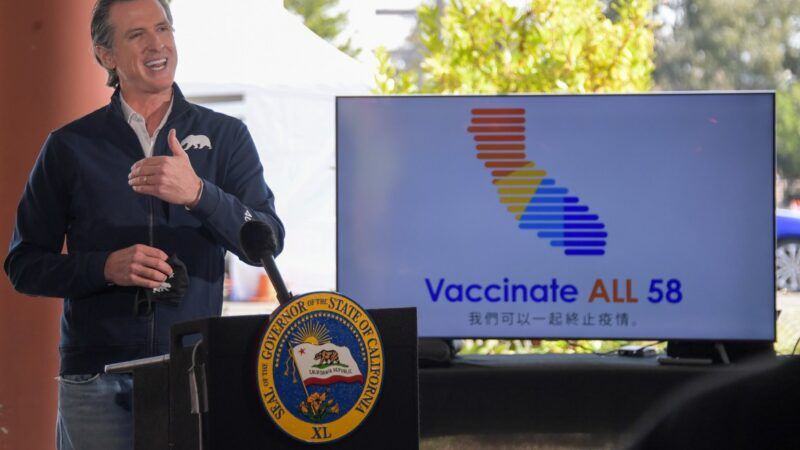Gov. Gavin Newsom Clings to COVID-19 Emergency Powers
The state is scheduled to ease its lockdowns on June 15. But Newsom still wants the power to control the terms.

California Gov. Gavin Newsom has responded to the COVID-19 pandemic with a controlling, micromanaging leadership style that few other governors can match. Even as other states have lifted a lot of COVID-19 restrictions for those who have been vaccinated, following the guidance of the federal Centers for Disease Control and Prevention (CDC), the California Democrat is ordering the state to re-open on his terms, not easing up the rules until June 15.
And even though Newsom has declared that the state will be "reopening" that day, he announced Friday that he won't be declaring an end to the emergency and—the big issue here—won't be surrendering his emergency powers.
California's Emergency Services Act grants the governor extremely broad powers when he declares an emergency: "complete authority over all agencies of the state government and the right to exercise within the area designated all police power vested in the state by the Constitution and laws of the State of California." The act is explicit that when these emergencies are declared, the governor's orders "shall have the force and effect of law," albeit with some restrictions—he cannot suspend the Constitution or confiscate legally owned firearms.
"We're still in a state of emergency," Newsom said Friday. "This disease has not been extinguished. It's not vanished. It's not taking the summer months off."
Many diseases have not been extinguished or vanished, but it would be absurd for a governor to take near-complete control to respond to all of them. New COVID-19 cases and deaths in California have plunged to levels that can be managed without the governor's intrusive involvement.
Two Republican members of the California State Assembly, James Gallagher and Kevin Kiley, have been attempting to challenge the extent of Newsom's emergency authorities in court, arguing that the delegation of lawmaking power to the governor violates the state's constitution. The state's 3rd District Court of Appeal in Sacramento upheld the law last month. Gallagher and Kiley are currently asking the California Supreme Court to take up the case.
Distressingly, the pushback against Newsom's move has fallen along partisan lines. Two Republican lawmakers introduced a bill in December that would limit the duration of a governor's emergency orders to 60 days, after which the governor would need to seek lawmakers' approval for each new regulation. The bill went nowhere. A Senate bill to terminate Newsom's original emergency declaration, also introduced in December, has similarly gone nowhere. The eight senators co-sponsoring that bill are all Republicans.
In other states, such efforts haven't been quite so partisan. In Kentucky, Ohio, and New York, lawmakers in both parties have been concerned about abuses of executive power.
The Los Angeles Times adds some useful context demonstrating the problems with giving the executive branch this much control. The state's Occupational Safety and Health Standards Board is recommending rules that will allow workers to be maskless only if their coworkers are all vaccinated and would require workplaces to maintain vaccination records for their employees. If any employee is unvaccinated, everybody has to wear masks. These rules are stricter than the CDC's recommendations, and infectious disease experts say they could be looser. But because of Newsom's emergency powers, the legisltors' ability to force changes to these rules is limited.
Newsom is facing a recall in the fall, so the voters will get an early opportunity to decide whether he has abused his authority. The politicians who have been calling the recall an attempt to "undermine democracy," as Sen. Bernie Sanders (I–Vt.) put it, should stop and take stock of what Newsom is doing here: He is deliberately excluding legislators from their constitutional role in crafting the state's laws. Who exactly is undermining democracy here?


Show Comments (73)